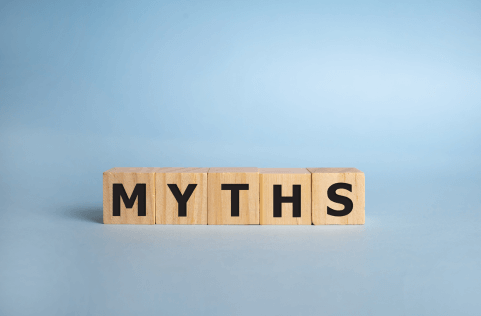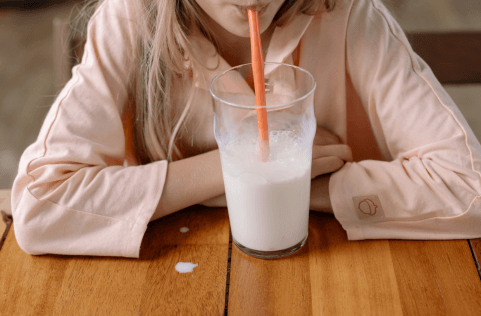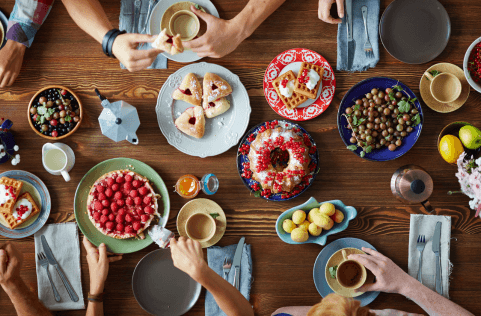With the rise of social media and the internet, nutrition myths are everywhere. There is nutrition information on the cover of every magazine in the grocery store checkout line and in every news headline. However, it’s interesting how these seemingly harmless nutrition tips actually seem to be pushing weight loss and diet culture rather than factual nutrition facts.
Nutrition myths are ubiquitous on social media and the internet today. They come in the form of messages that are pushing the same language that lets consumers believe that if they are to eat in a specific way they will finally be able to change their body shape and size for good. These messages can be so tempting because many of us desperately want to believe it's true. However, we have to be critical about who is providing this information. Many times, individuals do not have a background in nutrition or are simply trying to make a profit.
Evidence-based nutrition information isn’t new and definitely doesn’t sell products. Marketing executives and social media influencers typically have to twist nutrition information into “tips, tricks and secrets” in order to make a profit and keep the consumer feeling that this time, this product is going to work for them.
The twisted information they talk about with large audiences can be harmful to our health as nutrition is not a one size fits all recommendation. Every person has their own unique needs when it comes to food. Following nutrition misinformation can lead to restriction of key vitamins and minerals by eliminating entire food groups that can lead to a cascade of deficiencies and symptoms that impact our physical health.
Not to mention, the misinformation often peddled by the media and influencers is harmful to our relationship to food and our body. By coming up with new diets or fads to follow, nutrition misinformation is keeping consumers on a dieting roller coaster as they are still holding on to the idea that this new product is going to help them change their body for good.
However, we know that diets don’t work. So, promoting nutrition misinformation is setting consumers up for food preoccupation, shame and guilt around foods and disconnection from social situations in their lives. While it can be tough to sift through all the noise, our team loves to support our clients in navigating this misinformation and reconnecting with normalized eating without the traces diet culture.
With all the misinformation it can be difficult to decipher fact from fiction, but we’re here to help. Here are five common nutrition myths, without the side serving of diet culture!

5 nutrition myths debunked
1. you can't eat after 7 PM
Thanks, Oprah, for this nutrition myth! At some point in history Oprah mentioned that she never eats after 7:30 pm and, as with many pieces of nutrition misinformation in diet culture, the idea caught on. We have so many clients coming into sessions wondering if there is a certain time at night that they should stop eating. So, what’s the truth? Well, honestly, the body doesn’t know what time it is and it doesn’t care. If you are lacking nourishment, your body will let you know that you should eat something - whether that’s at 6 am or 10:30 pm. Yes, we have an internal clock and a circadian rhythm, but that’s based on the sun, not the number on the clock.
Basing all of your eating decisions off the time of day can lead to a sense of body disconnection and mistrust. This typically happens when you eat outside of those “designated eating times” which can lead to feelings of shame, guilt and a whole lot of negative self-talk. How would it feel instead to remember that the clock can be a tool to help ensure you are eating consistently but the clock does not know your body’s needs.
There will be days when intake happens at different times and that’s okay! Welcome to being a human being with varying energy needs on a daily basis. The most important takeaway being that we can’t build body trust if we look to the clock to tell us when we’re hungry, full or allowed to eat. Working on giving ourselves unconditional permission to eat includes honoring our hunger, even when it comes past 7 pm. So, grab some peanut m+m’s and enjoy!
2. you must stay away from dairy
Especially in certain subsets of diet culture, the whole “dairy is unnatural for humans to drink” gets thrown around a lot. The truth is - the human species is about 300,000 years old. We’ve been drinking various kinds of milk (reindeer, cow, goat, sheep) for the last 10,000 years! Milk and other dairy products are rich in nutrients and other goodies that fuel our bodies and brains.
To a Neolithic farmer milk would have been a “superfood” due to its robust nutrition. Cow’s milk packs a punch with adequate amounts of protein, carbohydrates, and fat for energy, brain and muscle function.
Not only does milk have all three macronutrients neatly packaged together, it is also a great source of calcium and phosphorus to support bone health. Additionally, many dairy products, such as yogurt, sour cream, and some kinds of cheese are fermented. Fermentation can make the lactose easier to digest and offers some good bacteria to help populate our gut microbiome.
Although many diet culture gurus seem to believe that dairy is “bad,” we believe that all foods can fit in our lives. Of course, if you are lactose intolerant, have a dairy allergy, or dairy just doesn’t sit right in your stomach, we do not want you consuming dairy. But If you tolerate dairy, it’s a creamy, versatile option that can find a place in breakfast, lunch, dinner and snacks! Now, who wants some ice cream?

3. you can't eat the whole egg
The poor yolk of the egg has been through the ringer in the past 50 years. Unfortunately, nutrition science is still new in the eyes of science, and we’re still getting things wrong. (Just like the idea that your BMI can tell how healthy you are! Oops.) Anyway, similar to dairy, eggs are also nutritional powerhouses. They have lots of high quality protein, fats, potassium, vitamin D, B12, phosphorus, and zinc! BUT they only have all those fantastic nutrients that fuel our brains and bodies if you eat the yolk. The white really only has protein. In order to get the full nutritional benefits of eggs, including all those nutrients like vitamin D and B12 that are often hard to get in other foods, we gotta eat the whole egg! Plus it’s delicious! Sunny side up anyone?
4. you have to save dessert for after dinner
Who says you can’t have a cookie with your morning coffee? Why can’t you have apple pie for breakfast the day after Thanksgiving? Who says cereal has to be a breakfast food? What about cereal as an evening snack? A lot of our beliefs around why certain foods should be eaten at certain times of the day are actually a mixture of social constructs, habits, and a little diet culture.
Imagine you just finished a savory breakfast of an omelette with veggies, cheese, and salsa, and you’re thinking “hmm I could go for something sweet to really satisfy my palate after that meal.” What thoughts or food rules come up for you when you think about incorporating something sweet? What if you wanted a cinnamon roll? Or a chocolate croissant? Or even a brownie!
Recognizing the food rules that you hold is the first step because only then can we work to challenge them. Remember: food is food. Once we start practicing intuitive eating and listening to what is truly satisfying to us (which, by the way can be a combination of savory and sweet), we start to gain flexibility around the food rules we have internalized for most of our lives. If you don't know where to start with beginning to eat intuitively, NourishRX is here to support you.
When we let our body’s inner wisdom guide our food choices rather than external rules, we start to gain body trust, and feel truly satisfied after our meals. So, have that brownie after lunch! Or ice cream for an afternoon snack. And enjoy every bite.

5. canned and frozen foods aren't as nutritious as fresh
I’m not sure where the myth about canned and frozen foods being less nutritious than fresh foods came from, but it’s surprisingly counter-intuitive. From the moment fruits and vegetables are picked or harvested wherever they were grown around the world, they begin to lose nutrients. They are the most nutritionally dense the moment after they are picked. With time and storage, they start to lose some of those nutrients they had when they were first picked. This isn’t anything to be concerned about, this is simply the nature of food storage and transport.
However, frozen foods are often frozen directly after they were picked. Since they were picked at their peak of freshness, they were also frozen at their peak of freshness. The freezing process contains those nutrients so none are lost in storage or transport. Studies have even shown that some frozen foods have more nutrients than fresh foods.
The process of canning foods has a similar effect. Canning also helps to preserve some of the nutrients that would have been lost in storage and transport. Overall, no need to fear canned or frozen foods! They are safe and nutritious. Not to mention, they last practically forever! You can keep them in your pantry for months without them spoiling or losing nutrients.

how nourishrx can support you
At NourishRX, we know how hard it can be to spot these nutrition myths and debunk them yourself. If you are looking to start your journey of rejecting diet culture and embracing intuitive eating, our individualized services can help you distinguish fact from fiction. We are here to support you in your journey. Don’t hesitate to contact us.
Sources:
- Ghosh, Pallab. "When Did Humans Start Drinking Cow's Milk?" BBC Future, 18 Feb. 2019, https://www.bbc.com/future/article/20190218-when-did-humans-start-drinking-cows-milk.
- Aubrey, Allison. "An Evolutionary Whodunit: How Did Humans Develop Lactose Tolerance?" NPR, 27 Dec. 2012, https://www.npr.org/sections/thesalt/2012/12/27/168144785/an-evolutionary-whodunit-how-did-humans-develop-lactose-tolerance.
Comments Off on 5 Nutrition Myths Debunked